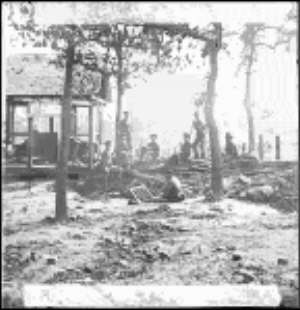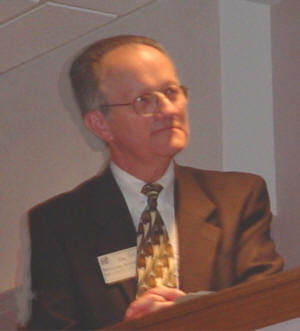Dr. William Anderson Reveals Intimate Details of Civil War in History
Writers of Regimental Histories Gain Panoramic View of Soldiers' Lives
May 9, 2004
By: Dave Rogers

Federal pickets near Atlanta, Georgia, where the 19th Michigan Infantry served during "Sherman's March to the Sea."

Dr. William Anderson, Civil War historian, who spoke here recently to a dinner sponsored by the 7th Michigan Cavalry Civil War Round Table.
How do you write a Civil War regimental history?
Ask Dr. William Anderson, director of the Michigan Department of History, Arts and Libraries (HAL).
First, you find 1,647 original letters and a few diaries written by Civil War soldiers from the same regiment.
Then, you spend about 10 years reading and analyzing them, getting to "know" these soldiers like you were a relative.
After a lot of painstaking writing, editing and re-writing, what do you end up with? Well, if you're William Anderson, a 397 page book entitled "They Died to Make Men Free," a history of the 19th Michigan Infantry in the Civil War.
Anderson found information about these soldiers that has never before been known. Take Charlie Prentice, from Otsego, for example. Charlie was a "goldbricker," always looking for ways to avoid duty.
Charlie played sick at Thompson's Station, near Nashville, Tennessee. The notorious Confederate General Nathan Bedford Forrest captured all the sick, lame and lazy and sent them all to Libby Prison in Atlanta. Lucky Prentice was exchanged back to Ohio.
On the other hand, there was Dr. Anderson's favorite soldier, Phineas Hager, from Allegan, a schoolteacher who "bared his soul" in his letters home. He was an ideal soldier, a first sergeant, who could be counted on every single time without exception.
"I was sad when Phineas Hager died in your book," a reader wrote to Anderson.
Intimate details of the lives of the men "can only be revealed when you have those kinds of source materials," Anderson said here at a recent meeting of the 7th Michigan Cavalry Civil War Round Table. "You're listening to their testimony; they tell exactly what they feel because they were writing private letters."
"You better burn this," one soldier wrote his wife, referring to a particularly sensitive part of his letter home. Obviously, she didn't, and that fact made the regimental history more complete.
It's an awesome responsibility being the only person in history to have read all the letters and diaries from the regiment, Anderson mused. "It allows you to be privy to history that is not possible any other way."
There were 500 regimental histories written by soldiers who had served in the war. Most of them were "sugar coated" since the writers didn't want to say anything uncomplimentary about their comrades. The "new" histories, done by modern-day historians who have access to all the source materials, are more objective, and more revealing, Anderson said.
What did Anderson find out about the question that has perplexed historians for 140 years since the war ended: Why did the soldiers fight?
"Every Union soldier fought to preserve the Union," he concluded. "The Confederates fought for independence and freedom." Ending slavery was the motivation of "a small minority," Anderson said, "but even that group didn't believe black people were equal." However, he emphasized: "There is no question the cause of the war was slavery."###